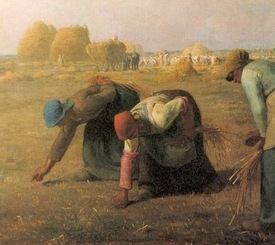 I’m amazed at the comments being made by some evangelicals, in this case the son of Jerry Falwell, that “charity” is purely voluntary and individual, and that charity is not designed by God or by Jesus to be something done by the government. What is happening is that some conservatives are now equating libertarian principles with the Bible and with the biblical world. Libertarian care for the poor is utopian. I quote from Falwell, not because he’s alone, but because he represents a growing trend. Here is a clip from CNN.com:
I’m amazed at the comments being made by some evangelicals, in this case the son of Jerry Falwell, that “charity” is purely voluntary and individual, and that charity is not designed by God or by Jesus to be something done by the government. What is happening is that some conservatives are now equating libertarian principles with the Bible and with the biblical world. Libertarian care for the poor is utopian. I quote from Falwell, not because he’s alone, but because he represents a growing trend. Here is a clip from CNN.com:
But a prominent evangelical leader says he, too, is suspicious of churches that preach economic and social justice.
Jerry Falwell Jr., president of Liberty University, a Christian college in Virginia, says Jesus wasn’t interested in politics. He says that those pastors who preach economic and social justice “are trying to twist the gospel to say the gospel supported socialism.”
Jesus taught that we should give to the poor and support widows, but he never said that we should elect a government that would take money from our neighbor’s hand and give it to the poor,” Falwell says.
Falwell says that Jesus believed that individuals, not governments, should help the poor.
“If we all did as Jesus did when he helped the poor, we wouldn’t need the government,” says Falwell, the son of the late evangelical leader, the Rev. Jerry Falwell.
So, let’s consider some basic texts in the Law, which means this: according to our understanding of Scripture, this is God speaking and this is God’s will and this is God’s will for Israel and this is God’s will for a people that was still following that will at the time of Jesus and at the time of the Apostle Paul. Since they never said, “This stuff is verboten, we can assume they thought this sort of law was viable for their world.” That Jesus didn’t speak about electing a government is beside the point; he didn’t have that option. He did live in a world governed by a Torah that let the government have laws that mandated care for the poor. He lived in a world that didn’t just leave it up to individuals. Sure, there was lots of private charity. That too, on top of laws.
First, the law of gleaning mandated — a command from God — that farmers leave a portion of their crops unharvested for the poor. (Think Ruth; without this law perhaps she doesn’t survive.) Sure, they had to choose to do this but it was mandated law not simply voluntary practice. Leviticus 19:
19:9 “‘When you gather in the harvest of your land, you must not completely harvest the corner of your field, and you must not gather up the gleanings of your harvest. 19:10 You must not pick your vineyard bare, and you must not gather up the fallen grapes of your vineyard. You must leave them for the poor and the foreigner. I am the Lord your God.
25:8 “‘You must count off seven weeks of years, seven times seven years, and the days of the seven weeks of years will amount to forty-nine years. 25:9 You must sound loud horn blasts – in the seventh month, on the tenth day of the month, on the Day of Atonement – you must sound the horn in your entire land. 25:10 So you must consecrate the fiftieth year, and you must proclaim a release in the land for all its inhabitants. That year will be your jubilee; each one of you must return to his property and each one of you must return to his clan. 25:11 That fiftieth year will be your jubilee; you must not sow the land, harvest its aftergrowth, or pick the grapes of its unpruned vines. 25:12 Because that year is a jubilee, it will be holy to you – you may eat its produce from the field.
Release of Landed Property25:13 “‘In this year of jubilee you must each return to your property. 25:14 If you make a sale to your fellow citizen or buy from your fellow citizen, no one is to wrong his brother. 25:15 You may buy it from your fellow citizen according to the number of years since the last jubilee; he may sell it to you according to the years of produce that are left. 25:16 The more years there are, the more you may make its purchase price, and the fewer years there are, the less you must make its purchase price, because he is only selling to you a number of years of produce. 25:17 No one is to oppress his fellow citizen, but you must fear your God, because I am the Lordyour God. 25:18 You must obey my statutes and my regulations; you must be sure to keep them so that you may live securely in the land.
4:16 Now Jesus came to Nazareth, where he had been brought up, and went into the synagogue on the Sabbath day, as was his custom. He stood up to read, 4:17and the scroll of the prophet Isaiah was given to him. He unrolled the scroll and found the place where it was written,
4:18 “The Spirit of the Lord is upon me,
because he has anointed me to proclaim good news to the poor.
He has sent me to proclaim release to the captives
and the regaining of sight to the blind,
to set free those who are oppressed,
4:19 to proclaim the year of the Lord‘s favor.“
14:28 At the end of every three years you must bring all the tithe of your produce, in that very year, and you must store it up in your villages. 14:29 Then the Levites (because they have no allotment or inheritance with you), the resident foreigners, the orphans, and the widows of your villages may come and eat their fill so that the Lord your God may bless you in all the work you do.
13:5 Therefore it is necessary to be in subjection, not only because of the wrath of the authorities but also because of your conscience. 13:6 For this reason you also pay taxes, for the authorities are God’s servants devoted to governing. 13:7 Pay everyone what is owed: taxes to whom taxes are due, revenue to whom revenue is due, respect to whom respect is due, honor to whom honor is due.
8:13 For I do not say this so there would be relief for others and suffering for you, but as a matter of equality. 8:14 At the present time, your abundance will meet their need, so that one day their abundance may also meet your need, and thus there may be equality, 8:15 as it is written: “The one who gathered much did not have too much, and the one who gathered little did not have too little.”

